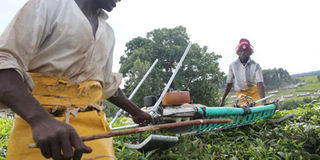Mechanised tea harvesting the best bet

Farmers in Kericho on March 8, 2016 harvest tea using a tea plucking machine. Employment will only be sustainable if the value of workers’ daily output exceeds staff costs. PHOTO | TONNY OMONDI | NATION MEDIA GROUP
What you need to know:
- Quality deterioration is mainly due to mechanical injury and non-selective plucking unlike when hand-plucking is done.
- Mechanised harvesting improves productivity. It also offers smallholders an avenue for improved earnings.
Traditionally, tea harvesting has been done by hand, especially among smallholders.
But in recent times, most of the large-scale tea producers have started using machines.
The chemical quality parameters of black tea change with the method of harvesting.
Quality deterioration is mainly due to mechanical injury and non-selective plucking unlike when hand-plucking is done.
Critics say mechanisation will lead to significant job losses and should be opposed.
However, machines increase the average plucking with a net decrease in the cost of production.
WAGE COST
The use of machinery hastens production, improves productivity, and reduces the fatigue in human labour to produce better quality goods and services.
Just like the technological revolution occurring across the services industry, mechanisation is driven by the need to cut the increasing wage cost.
The challenge is to ensure a harmonious transition to a production model where the use of machines complements labour.
Mechanisation, which is as old as the tea industry itself, is now inevitable because producers need to reduce the astronomical costs of production if they are to remain in business.
The expenditure incurred by tea producers is too high, hence the need to introduce measures for the industry’s long-term development.
INCREASE COMPETITIVENESS
Tea harvesting involves the removal of the tender growing shoots from the surface of the bush, and producers can choose between fine and course plucking.
In fine plucking, only a bud, the second and maybe third leaves are plucked.
In course plucking more leaves are picked together with the bud.
Mechanisation is being embraced by Kenya’s main competitors abroad. Resisting it will only make Kenya less competitive.
Mechanised harvesting improves productivity. It also offers smallholders an avenue for improved earnings.
However, while tea pricing is independent of the harvesting method adopted, it is directly affected by leaf appearance, density and liquor, which are the results of environmental factors such as climate, soil type and altitude and managerial factors: leaf quality, cultivar type and processing method.
EMPLOYMENT
The total leaf yield from mechanised tea harvesting is greater than in hand plucking, with reduced production costs.
In the long run, mechanisation will result in a smaller, but better-paid workforce.
It will also lead to the creation of new jobs amongst the suppliers of machines, operational and maintenance crews.
Using state-of-the-art machinery increases productivity and reduces production costs.
How does one achieve a harmonious transition?
Despite the hype that has over the years surrounded mechanisation, not one person has been retrenched or made redundant by the large-scale producers.
The industry has to change or it will die, to everyone’s detriment.
Besides wages, plantations provide free housing, medical, and education schemes for workers’ dependents.
This and the cost of compliance with various statutory regulations and certifications simply add to the pressure to modernise.
TIME IS NOW
Poverty eradication is one of the benefits of any economic activity. Increasing productivity is inevitable and mechanisation is the best way to achieve this.
Insistence on manual labour will simply put large-scale growers out of business, and ensnare the tea sector in a vicious cycle of poverty.
Employment will only be sustainable if the value of workers’ daily output exceeds staff costs.
There is a need to discuss how to incorporate mechanisation in tea production. It is no longer a matter of ‘if’ but ‘when’.
Dr Kunyanga is a lecturer at the University of Nairobi. [email protected]



